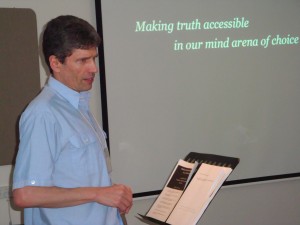© 2020 André Radatus
© 2020 International Urantia Association (IUA)
| Living the Gospel and Proclaiming with Power in the 21st Century | Journal — November 2020 — Index | Comprehension – Advancing Brilliance from Insight |

(Editor’s note: This is from a presentation given at the 2018 Urantia Association International conference in the Netherlands)
Everyone knows the futility of preaching about things that are desirable, yet the general helplessness in this situation is so great, and the need so dire, that one prefers to repeat the old mistake instead of racking one’s brains over a subjective problem. Besides, it is always a question of treating one single individual only and not ten thousand, where the trouble one takes would ostensibly have more impressive results, though one knows well enough that nothing has happened at all unless the individual changes.
The effect on all individuals, which one would like to see realized, may not set in for hundreds of years, for the spiritual transformation of mankind follows the slow tread of the centuries and cannot be hurried or held up by any rational process of reflection, let alone brought to fruition in one generation. -Carl Gustav Jung, The Undiscovered Self, 1958
The Swiss psychiatrist and father of analytical psychology, Carl Jung, reminds us that the world needs fewer preachers and better teachers.
Students of The Urantia Book know as well that the mass of humanity progresses one person at a time, not by teaching them en masse, but as they are ready to grow.
Youth are often “inartful” in teaching all the truth they’ve acquired but haven’t yet lived.
My experience encountering The Urantia Book in Canada is a testament to that. More pain could have been avoided had I understood that even good words can fall on deaf ears, especially when experience is not there to back them up.
Of course, my enthusiasm for newfound truth had me set like a bear trap, ready to ensnare any unsuspecting target on whom I projected the slightest interest in spiritual things. This is like marching one’s queen onto the chessboard in the first several moves, or kicking the football toward the goal from the other end of the field. Instant “solutions” are rarely successful propositions.
Teaching is not preaching. We recognize the difference easily. In the latter, we are told what is true by virtue of supposed authority. In the former, in its best form, we are presented with an opportunity to learn through the authority of experience, best of all, our own experience and, thereby, we become the authors of our own lives.

Were you one of the privileged few who experienced at least one masterful teacher in your life? What created admiration for that teacher? What words and actions of this teacher do you carry forward day by day? What made their teaching memorable? Livable? Worthy to emulate?
Consider that much of Michael of Nebadon’s love for you manifests as teaching. Why does Jesus’ masterful teaching resonate with us? In worshipful communion with his heavenly Father, was he not always talking over his problems? Jesus’ behavior has allowed us the privilege of witnessing in The Urantia Book the acme of human life and religious living only because Jesus’ character growth was never impeded by a self-centered will.
In his outer life, he paid close attention to the world in which he lived and to its people. He developed expertise at every task he undertook that he might the better be able to serve. By those skills and character acquirements, his credibility was established for those who appraised it with honesty.
The revelation that Jesus’ unbroken communion led to his ceaseless progress in doing the will of the Father in heaven is a golden key to the living of our lives. We grow our souls by sharing our inner life with God as he did. The Master knew that living in the presence of God with faith is living present to true reality. We only realize we are living in our Father’s presence if we act as if we are in God’s presence.
The doing of the will of God is nothing more or less than an exhibition of creature willingness to share the inner life with God … [UB 111:5.1] …and… The imitation of God is the key to perfection … [UB 111:5.2]
Unlike the Master, by our often inadvertent and sometimes willful broken relations with our Divine Parent, we must be shown what we are losing by temporarily living in the ensuing spiritual isolation.
… sometimes your most disappointing disappointments have become your greatest blessings. Sometimes the planting of a seed necessitates its death, the death of your fondest hopes, before it can be reborn to bear the fruits of new life and new opportunity. [UB 48:6.36]

The Master’s life amply illustrates that, while doing the will of God in human life leads to joy, it also leads to more of the right kind of disappointments; those that become instructive, leading to the most creative solutions to the obstacles we encounter in trying to live a good life.
Joshua ben Joseph lived his many trials in God’s presence. His dynamic morality centered on a positive appreciation of the will of his Father. His adaptation to every new service opportunity or problem grew the wisdom born of outer–life experience brought into his inner life. To teach that to others, we must strive for that same creative worship-service balance in life.
Will we not also have greater effect with each person with whom we grow a personal relationship? a friendship of growing mutual reciprocal knowledge and love of the other? Jesus allowed his influence to develop through the friendship of a master teacher with his willing students, be they apostles or tax collectors.
Can we take Jesus’ approach to teaching and preaching and apply it as is to our circumstances today? We are told that,
… at the time of his birth Urantia was experiencing such a revival of spiritual thinking and religious living as it had not known in all its previous post-Adamic history nor has experienced in any era since. [UB 121:1.1]
Few today on our world will receive Jesus’ gospel message in any direct manner. How to attract people to living truth is the problem to be solved by every culture. It is different in every society. What works in one locale may or may not work in another. If our world is to…
…see Jesus living again on earth in the experience of spirit-born mortals who effectively reveal the Master to all men. [UB 195:10.1]
then women and men must be determined in their desire to experience the human condition as he did.
Let me emphatically state this eternal truth: If you, by truth co-ordination, learn to exemplify in your lives this beautiful wholeness of righteousness, your fellow men will then seek after you that they may gain what you have so acquired. The measure wherewith truth seekers are drawn to you represents the measure of your truth endowment, your righteousness. The extent to which you have to go with your message to the people is, in a way, the measure of your failure to live the whole or righteous life, the truth-co-ordinated life. [UB 155:1.5]
Whatever this series of steps to your full human-service potential is, the next step is in front of you. Are we not being continually shown, if only we had the eyes to see? Might we not just be the one to make that difference that is needed and right for our little part of our corner of our disordered world? If not you, who?

True and good teachers are needed!
(Consider that this revelation needs teachers and leaders and that the nascent Urantia Book Internet School, Urantia University Institute, and International Center for Urantia Studies have interest in students and in those who would teach them.)
Those, who would patiently and personally guide you are in short supply when compared with those who expect you to accept whatever they have to say without condition or without any critical reflection whatsoever. While master teachers must be trained and must teach to gain the experience to achieve mastery, they must also be grown, in partnership with God, from the inside out. Jung understood the unconscious nature of such personal growth and its subtle influence on others:
What does lie within our reach, however, is the change in individuals who have, or create, an opportunity to influence others of like mind in their circle of acquaintance. I do not mean by persuading or preaching – I am thinking, rather, of the well-known fact that anyone who has insight into his own actions, and has thus found access to the unconscious, involuntarily exercises an influence on his environment. … It is an unintentional influence on the unconscious of others, a sort of unconscious prestige, and its effect lasts only so long as it is not disturbed by conscious intention.
Carl Jung, The Undiscovered Self
Juxtaposed with our revelation:
… Graciousness is the aroma of friendliness which emanates from a love-saturated soul. [UB 171:7.1]
Our love for God and compassionate desire to serve and teach our brothers and sisters, will plumb the depths of our own unique God-given creativity. The stimulating challenge of seeking to understand and love our fellows is an impetus to masterful service of humanity. It just begins with grasping our Father’s strong and loving hand and taking one more step towards the next right thing to do. Who knows where it will lead?
One of the original members of the Forum, Clyde Bedell, had a simple dictum: “Big things start small.”

Look no further than the fields outside this room to see the fruition of Carolus Clusius’s first planting of tulips at Leiden 425 years ago! Or inside these walls to see the results of Henry, Bauk, and Nienke Begemann’s Dutch translation of Het Urantia Boek more than fifty years ago! Who could have imagined this fruit back then: this inspiring conference?
Good and plentiful harvests eventuate from the good, simple choices we lovingly pursue.
What will begin from your next step?
¶ References
| Living the Gospel and Proclaiming with Power in the 21st Century | Journal — November 2020 — Index | Comprehension – Advancing Brilliance from Insight |